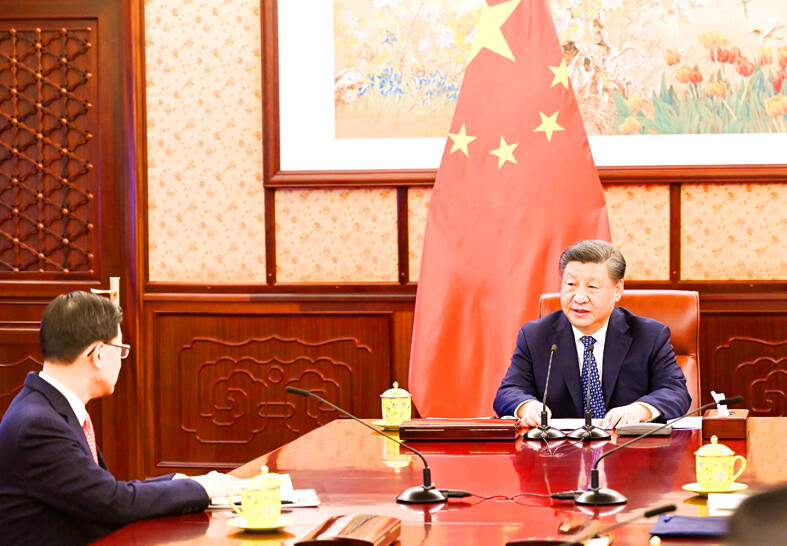China’s top lawmaking body has given Hong Kong Chief Executive John Lee (李家超) the power to bar foreign lawyers from national security cases, removing the decision from the territory’s courts, in a move likely to further fuel concerns over judicial independence.
The use of foreign lawyers by prosecutors and the defense have long been part of Hong Kong’s rule of law traditions.
The move, reported on Friday by Xinhua news agency, came after a Hong Kong court this month postponed a national security trial against media tycoon and China critic Jimmy Lai (黎智英) to September, to give time for the ruling by the Chinese National People’s Congress Standing Committee (NPCSC).

Photo: EPA-EFE
In November last year, Lee had asked the NPCSC to weigh in on the matter after a series of failed attempts by the Hong Kong Department of Justice to block British lawyer Timothy Owen from defending Lai.
Critics say Beijing’s intervention in this landmark legal case undermines Hong Kong’s judicial independence, after a panel of three senior judges on the Hong Kong Court of Final Appeal in November last year rejected a government bid to block Owen from representing Lai.
The NPCSC ruling said that Hong Kong courts must now obtain approval from the chief executive before admitting any foreign lawyer without local qualifications to work on national security cases.
If the courts do not do so, the Hong Kong Committee for Safeguarding National Security, which is led by the chief executive and Beijing’s liaison office head, would make a decision on the matter.
Under Hong Kong’s National Security Law, decisions made by the committee cannot be challenged by a judicial review.
Lee told a news conference late on Friday that the decision only involves “a very small area,” as they are only looking at whether overseas lawyers should be allowed to take part in national security cases.
“Beyond national security cases, then they are most welcome, provided that they satisfied the procedure to obtain an ad hoc admission approval by the court,” Lee said.
Legal academic Eric Lai (黎恩灝) wrote on Twitter that the decision “creates a de facto political-legal committee for Hong Kong,” as judicial independence vanishes when executive authorities can override a court decision without being challenged by a judicial review.
Jimmy Lai, who has been in custody for nearly two years, faces possible life imprisonment under the China-imposed National Security Law, for charges including alleged collusion with foreign countries.

FORCED LABOR: A US court listed three Taiwanese and nine firms based in Taiwan in its indictment, with eight of the companies registered at the same address Nine companies registered in Taiwan, as well as three Taiwanese, on Tuesday were named by the US Department of the Treasury’s Office of Foreign Assets Control (OFAC) as Specially Designated Nationals (SDNs) as a result of a US federal court indictment. The indictment unsealed at the federal court in Brooklyn, New York, said that Chen Zhi (陳志), a dual Cambodian-British national, is being indicted for fraud conspiracy, money laundering and overseeing Prince Holding Group’s forced-labor scam camps in Cambodia. At its peak, the company allegedly made US$30 million per day, court documents showed. The US government has seized Chen’s noncustodial wallet, which contains

SUPPLY CHAIN: Taiwan’s advantages in the drone industry include rapid production capacity that is independent of Chinese-made parts, the economic ministry said The Executive Yuan yesterday approved plans to invest NT$44.2 billion (US$1.44 billion) into domestic production of uncrewed aerial vehicles over the next six years, bringing Taiwan’s output value to more than NT$40 billion by 2030 and making the nation Asia’s democratic hub for the drone supply chain. The proposed budget has NT$33.8 billion in new allocations and NT$10.43 billion in existing funds, the Ministry of Economic Affairs said. Under the new development program, the public sector would purchase nearly 100,000 drones, of which 50,898 would be for civil and government use, while 48,750 would be for national defense, it said. The Ministry of

SENATE RECOMMENDATION: The National Defense Authorization Act encourages the US secretary of defense to invite Taiwan’s navy to participate in the exercises in Hawaii The US Senate on Thursday last week passed the National Defense Authorization Act (NDAA) for Fiscal Year 2026, which strongly encourages the US secretary of defense to invite Taiwan’s naval forces to participate in the Rim of the Pacific (RIMPAC) exercise, as well as allocating military aid of US$1 billion for Taiwan. The bill, which authorizes appropriations for the military activities of the US Department of Defense, military construction and other purposes, passed with 77 votes in support and 20 against. While the NDAA authorizes about US$925 billion of defense spending, the Central News Agency yesterday reported that an aide of US

UNITED: The other candidates congratulated Cheng on her win, saying they hoped the new chair could bring the party to victory in the elections next year and in 2028 Former Chinese Nationalist Party (KMT) lawmaker Cheng Li-wun (鄭麗文) yesterday won the party’s chair election with 65,122 votes, or 50.15 percent of the votes. It was the first time Cheng, 55, ran for the top KMT post, and she is the second woman to hold the post of chair, following Hung Hsiu-chu (洪秀柱), who served from 2016 to 2017. Cheng is to succeed incumbent Eric Chu (朱立倫) on Nov. 1 for a four-year term. Cheng said she has spoken with the other five candidates and pledged to maintain party unity, adding that the party would aim to win the elections next year and